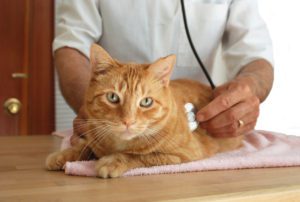Top 10 Cat Emergencies in Wilton Manors, FL
Cats are prone to many issues that may call for an emergency vet visit. These problems may include difficult breathing, temporary paralysis, changes in eating habits, seizures, and a variety of other things. If your cat is having an emergency and you’re unsure of what to do, don’t wait; always contact your veterinarian immediately. Call Arbor Pet Hospital today at (954) 565-1896.

1. Urinary Obstruction
Cats, especially males, commonly experience urinary obstruction. This is when the urethra, the tube that drains urine, becomes obstructed due to kidney stones, mucus, crystals, or other material. The cause of urinary obstruction can vary and the condition is not well understood, but it is thought that poor diet or infections may be contributing factors. Vets can take blood work to determine that this is the source of your cat’s problems. Your cat will likely require a catheter or surgery to fix the issue.
2. Severe Pain or Distress
In the wild, cats have evolved to hide their pain when possible, as predator animals may be attracted to a cat in this weakened state. If your cat is crying out or writhing in pain, it is likely that some issue has become so severe that they can no longer hide it. Signs of pain in your cat can include a decrease in their activity routines, limping, less time spent grooming, and decreased ability to jump. Consult your vet if you notice your cat is in pain or distress.
3. Difficult Breathing
Respiratory issues are quite common in felines. The signs for breathing problems include panting, flared nostrils, coughing, raspy breath, and breathing with their mouth open. Respiratory illness can be a sign of underlying health problems, so contact your vet immediately to get your cat a check up. The cause could be anxiety, pneumonia, fever, dehydration, obesity, or a number of other problems. Your cat may require antibiotics, steroids, or even surgery, depending on the issue at hand.
4. Paralysis
Paralysis in the hind legs of cats points to a common, yet destructive condition known as Aortic thromboembolism, or ATE. The aorta is the main artery that carries blood throughout the bodies of most mammals. In cats, when this artery becomes blocked due to a blood clot, the blood flow to the hind legs is greatly reduced. This can lead to temporary or permanent paralysis of the legs, amongst other problems including lack of appetite and difficulty urinating. Consult your vet immediately if your cat is experiencing any form of paralysis.
5. Abnormal Eating or Drinking Habits
There are a variety of reasons that can lead to abnormal eating and drinking habits in your cat. Depression, stress, and anxiety are common in cats, especially when they are in chaotic environments or undergoing a big change. This can lead them to not eat or drink properly.
Another cause of abnormal eating is competition from other animals in the house. Make sure that dogs or other pets aren’t intimidating or stealing food from the affected cat. If your cat is still not eating or drinking properly, consult your vet so your cat can receive a check-up.
6. Vomiting or Diarrhea
Vomiting and diarrhea can be alarming issues that many cats experience. There are many causes for these issues, including viruses, toxins, medications, changes in diet, swallowing a foreign object, or stress. To avoid vomiting or diarrhea, introduce new foods slowly, mixing them into their old diet. Check your cat’s bowel movements for worms or parasites. Your cat may be experiencing stress due to overstimulation or boredom, so make sure they are receiving the proper amount of playtime. If the issue persists, make sure to get your cat medical care as soon as possible.
7. Seizures
Seizures are characterized by loss of consciousness, loss of control of bowel movements or urine, unusual vocalization, and convulsions. Grand mal seizures occur for a few seconds to a minute, while anything longer than a few minutes should be considered a medical emergency.
There are two types of seizures in cats: intracranial and extracranial. Intracranial seizures are caused by something inside the skull, such as brain inflammation, brain infections, tumors, or toxoplasmosis (brain parasites). Extracranial seizures occur from a force outside of the skull, such as high blood pressure, heatstroke, liver disease, or consumption of human medicine. The only other type of seizures are caused by epilepsy, which effectively means that the cause is unknown. If your cat experiences any form of seizure, promptly consult your vet.
8. Trauma
Many different events can lead to trauma in cats. The most common form of trauma is caused by aggressive confrontation with another cat. This can include scratches and bites that have both physical and mental consequences. This trauma can manifest itself in a variety of ways. Cats experiencing trauma may become silent and avoidant, steering clear of other cats and maybe even humans. They may even begin hiding for most parts of the day. This can be detrimental to their social health.
In addition, their appetite may change, leading to unhealthy changes in their body. To overcome trauma, make sure you are calm, careful, and attentive to your cat’s needs and moods. Avoid any repetitive trauma (if they are fighting with another cat, keep those two separated for some time).
9. Ingestion of Toxins
Many seemingly benign materials can be toxic to cats. The most common issue is human medication, as the strength and contents are not made for cats. Just two acetaminophen tablets have the capability to kill a cat, while antidepressants can cause vomiting or serotonin syndrome. The other common cat toxin is houseplants. Lilies, azaleas, daffodils, and a variety of other plants are potentially lethal to your feline friend. If ingested, contact your vet immediately.
10. Blindness
Sudden loss of vision can manifest itself in a few ways, including disorientation, excessive vocalization, running into objects, or general confusion. Blindness can be caused by a few things, including high blood pressure, brain disease, eye disease, and other issues. If you suspect that your cat has lost vision, this can be a serious issue, and a vet can quickly determine if your cat is actually blind.
